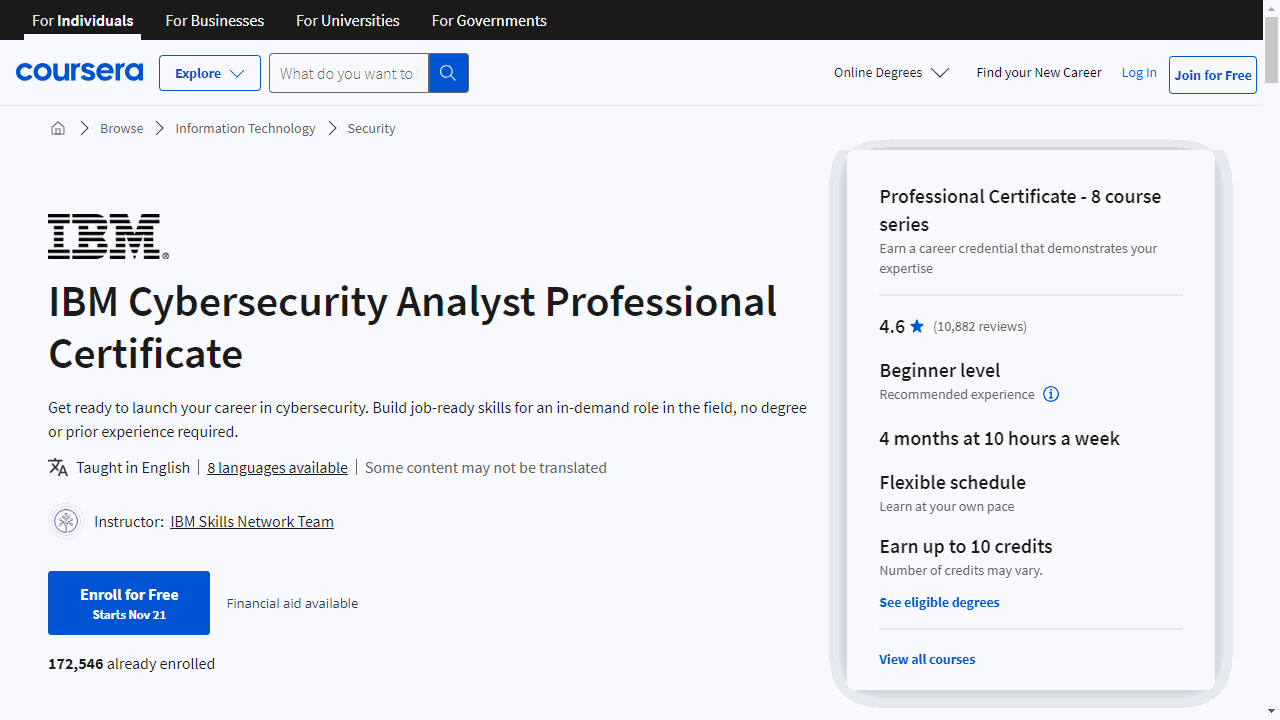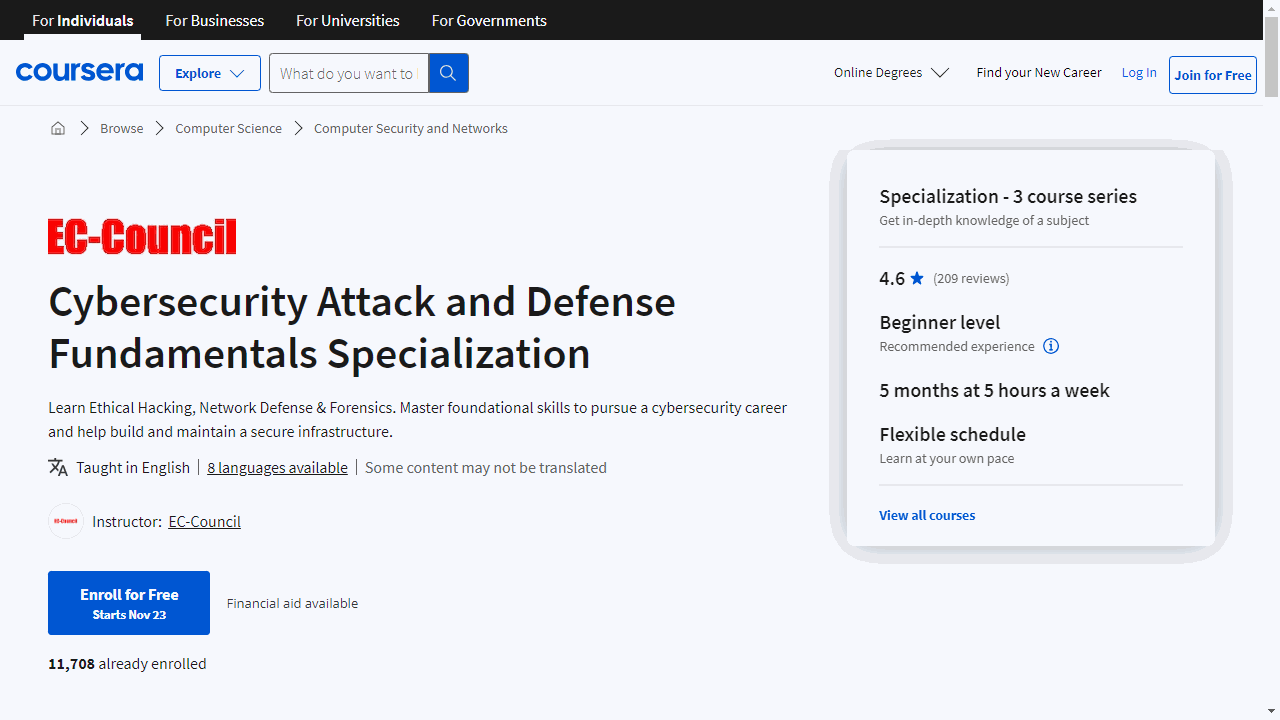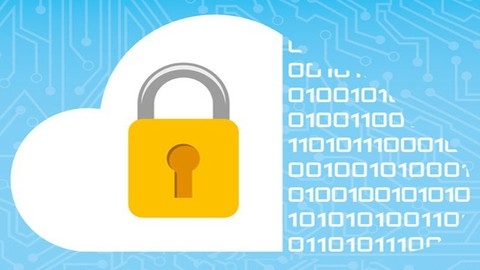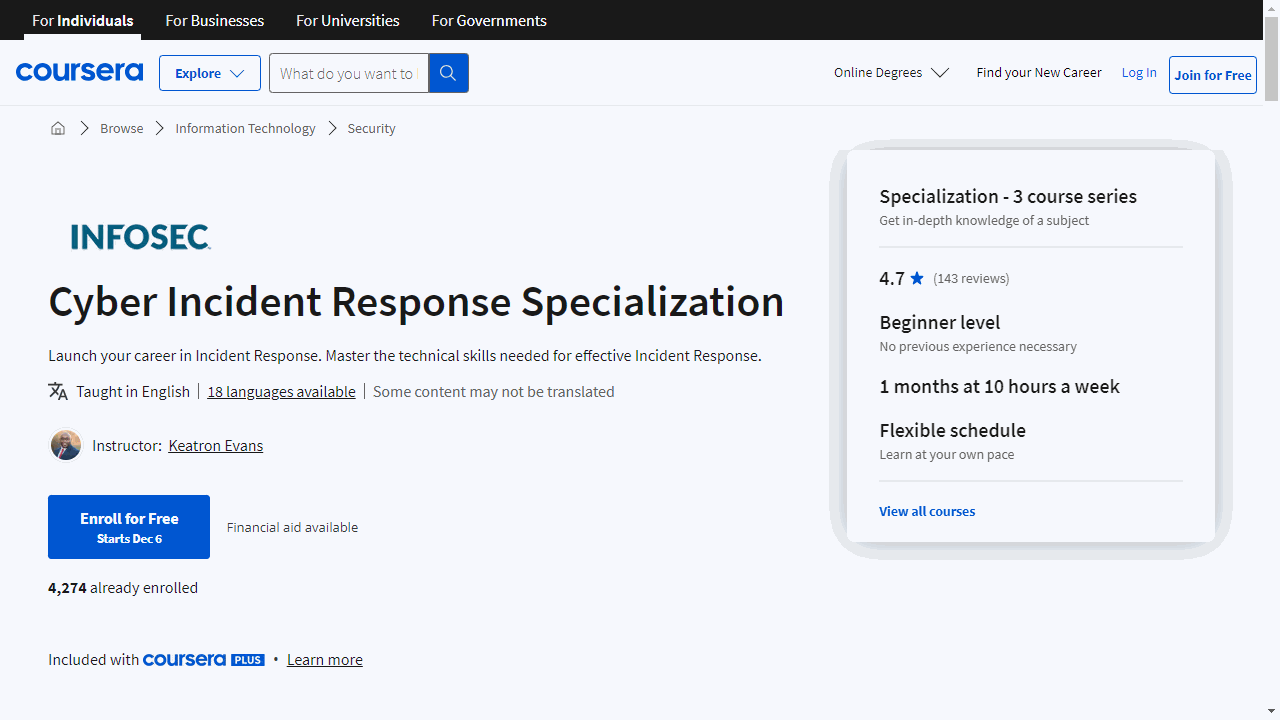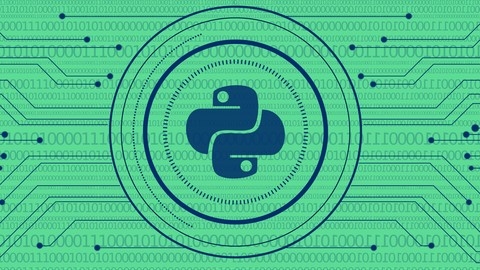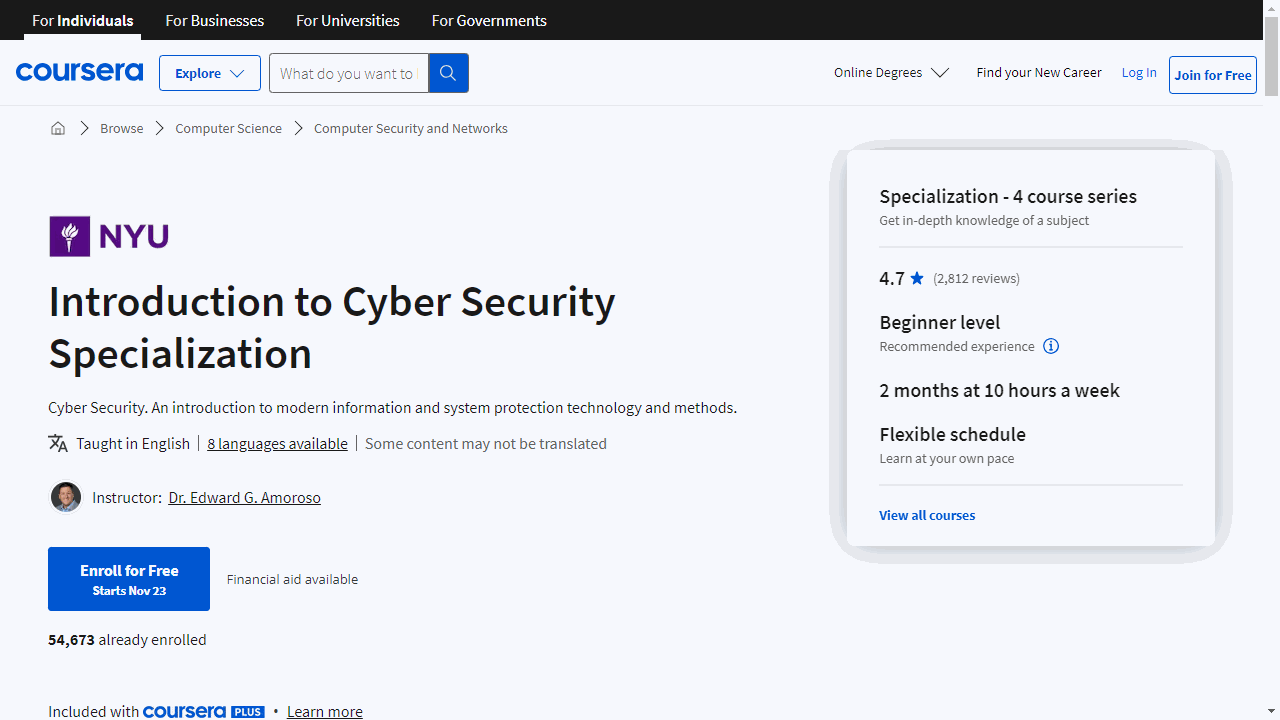Ethical hacking is a crucial field in cybersecurity that involves using hacking techniques to identify vulnerabilities in systems and networks.
By thinking like a malicious hacker, ethical hackers can proactively find and fix security flaws before they’re exploited by real attackers.
Learning ethical hacking can lead to exciting career opportunities in cybersecurity, protecting organizations and individuals from data breaches and cyber threats.
Finding the right ethical hacking course can be a challenge, with numerous options available online, each promising to turn you into a cybersecurity expert.
You’re searching for a course that provides practical skills, hands-on experience, and a deep understanding of hacking methodologies, not just theoretical concepts.
It’s important to choose a course that aligns with your learning style and goals, whether you’re a complete beginner or have some prior experience in IT.
Based on our research, Learn Ethical Hacking From Scratch on Udemy stands out as the best course overall.
This course offers a comprehensive and practical approach to ethical hacking, covering a wide range of topics from network security to web application vulnerabilities.
It provides hands-on exercises and real-world scenarios, allowing you to develop your skills in a safe and controlled environment.
This is just one of the many excellent ethical hacking courses available.
Keep reading to discover other top-rated options that cater to different learning preferences and areas of focus within ethical hacking.
We’ll explore courses for beginners, intermediate learners, and those seeking specialized knowledge in areas like web application security or network penetration testing.
Learn Ethical Hacking From Scratch
Provider: Udemy
This Udemy course on ethical hacking doesn’t waste any time throwing you into the deep end.
You’ll begin by building a safe hacking lab using virtual machines on your computer.
This lets you practice hacking without the risk of damaging your system.
You’ll use this lab to run Kali Linux, a special operating system for ethical hacking, even if your main system is Windows or Mac OS.
You’ll then learn the basics of Linux, mastering the terminal and commands, which are essential for using Kali’s powerful tools.
From there, you’ll jump into the world of network hacking, learning how to intercept data, trick devices, and even crack common Wi-Fi encryption methods like WPA2.
You’ll discover how to perform attacks like ARP poisoning, MITM attacks, and DNS spoofing, along with learning how to bypass security protocols such as HTTPS and HSTS.
The course teaches you how to think like a hacker by diving into techniques for gaining access to computers.
You’ll learn how to exploit vulnerabilities on both the server and client-side using tools like Metasploit.
You’ll also discover the art of social engineering – using tricks and manipulation to make people give you access to their systems.
You’ll even create your own undetectable backdoors and disguise them as harmless files like images or PDFs.
You’ll use BeEF, a tool that lets you control a victim’s web browser to run commands, steal passwords, and even take over their entire computer.
This course covers website hacking in-depth.
You’ll learn how to find vulnerabilities like file upload flaws, code execution loopholes, and SQL injection weaknesses that let you take over a website.
IBM Cybersecurity Analyst Professional Certificate
Provider: Coursera
This fourteen-course program takes you from cybersecurity history and common threats to advanced topics like penetration testing and cyber threat intelligence.
You’ll start by learning basic security concepts like the CIA Triad, incident response, and essential tools like firewalls and antivirus software.
You’ll then discover the different roles within cybersecurity, key processes, and the architecture of common operating systems, including Windows, Mac/OS, Linux, and Mobile.
You’ll then explore compliance frameworks and industry standards such as NIST, GDPR, HIPAA, and PCI.
You’ll also learn about system administration, endpoint security, patch management, cryptography, and encryption.
Next, you’ll dive into network security, learning about TCP/IP, the OSI framework, and routing.
You’ll also study database vulnerabilities and how to identify and address them, including SQL Injection.
The program then shifts to the more practical areas of cybersecurity, like penetration testing, incident response, and digital forensics.
You will learn how to conduct penetration tests, analyze security incidents, and collect digital evidence using various tools and techniques.
You’ll even gain experience with scripting, a valuable skill for any aspiring analyst.
You will also discover how to use threat intelligence platforms and network monitoring tools to protect against attacks and vulnerabilities.
Finally, you’ll learn about incident response methodologies, common vulnerabilities and attacks, and explore past breaches.
You’ll research a recent cyberattack and apply your new skills to analyze what happened and how to improve security.
This program provides the knowledge and practical skills you need to become a junior cybersecurity analyst, making you a valuable asset to any organization.
The Complete Ethical Hacking Course: Beginner to Advanced!
Provider: Udemy
This course thoroughly explains the world of ethical hacking.
You will learn the differences between ethical hackers (white hat), unethical hackers (black hat), and those in between (grey hat).
You will develop a strong understanding of important terms like footprinting, Denial of Service (DoS) attacks, Distributed Denial of Service (DDoS) attacks, and SQL injections.
The course then guides you through building a safe hacking environment on your own computer using Kali Linux and VirtualBox.
This virtual environment allows you to practice hacking without risking damage to your own system.
You will become comfortable working with the Linux terminal, a powerful interface for controlling your system.
Using your new virtual environment, you will dive into exciting hacking techniques.
You will learn how to attack wireless networks, crack passwords for Wi-Fi security protocols WPA/WPA2, and perform DoS attacks.
You will master powerful tools like Aircrack-ng, Reaver, and Nmap.
As you progress, you’ll explore advanced concepts like SSL stripping, creating keyloggers using the programming language C++, and using the Metasploit framework to gain control of remote systems.
The course covers a wide range of attacks, including brute-forcing passwords and SQL injections, and teaches you how to use tools like John the Ripper, Hydra, and ProxyChains.
These skills are invaluable for learning how to protect systems and data from real-world attacks.
You will gain hands-on experience throughout the course with detailed instructions and live demonstrations.
Cybersecurity Attack and Defense Fundamentals Specialization
Provider: Coursera
This three-part program teaches you how to hack like a pro, defend against attacks, and investigate cybercrime.
First, you learn the basics of ethical hacking and information security in Ethical Hacking Essentials.
You discover common security weaknesses and how hackers use them.
You practice real-world scenarios, like cracking passwords, attacking web applications, and even targeting Internet of Things devices.
Next, Network Defense Essentials teaches you how to protect networks from attack.
You learn about wireless networks, how to use encryption, and how to control who accesses what.
This course also covers cryptography, which is how we scramble information to keep it safe.
You explore techniques to make sure the right people access data, including using Public Key Infrastructure (PKI) for secure communication.
Finally, Digital Forensics Essentials teaches you how to investigate digital crimes.
You will learn how to gather evidence from computers and phones.
This course delves into malware analysis and network forensics, giving you the skills to dissect cybercrime scenes.
Website Hacking / Penetration Testing
Provider: Udemy
This course equips you with the knowledge and skills to delve into the world of website hacking, also known as penetration testing.
You start by building a secure hacking lab using virtual machines, familiarizing yourself with Kali Linux, a powerful operating system designed for this purpose.
This safe environment allows you to practice ethical hacking techniques without any real-world risks.
You will learn to identify and exploit common website vulnerabilities.
This includes mastering the art of SQL injection, cross-site scripting (XSS), and file upload vulnerabilities, gaining the ability to uncover weaknesses in websites and potentially access sensitive data.
You’ll become adept at using tools like BeEF to simulate attacks and understand their impact.
Through hands-on exercises, you’ll master tools like Hydra, OWASP ZAP, and Weevely, expanding your arsenal for ethical hacking.
You’ll learn how to conduct dictionary attacks, automate vulnerability scanning, and analyze the results, mirroring real-world penetration testing scenarios.
The course doesn’t just focus on attack strategies; it also emphasizes the importance of securing websites and applications.
You’ll explore methods like penetration testing and bug bounty programs, gaining a well-rounded understanding of both offensive and defensive security measures.
Cyber Incident Response Specialization
Provider: Coursera
The course starts by teaching you the steps of a typical cyber incident, like figuring out what happened, stopping the attack, and fixing the damage.
You will learn about all the different phases of incident response.
You then dive into the technical stuff, learning the tools and techniques used to investigate and stop cyberattacks.
You will get practical experience working with memory analysis, network traffic, and system logs to find the root cause of an attack.
You will even learn how to use special tools like packet analyzers to track network activity and spot any suspicious connections.
Through hands-on labs and projects, you’ll learn to use your knowledge in real-world situations.
Imagine tackling realistic cybersecurity challenges.
You will become skilled in essential security practices such as analyzing malware and understanding how hackers use the Domain Name System (DNS) to hide their tracks.
These hands-on labs will give you experience with the same tools security experts use.
Learn Python & Ethical Hacking From Scratch
Provider: Udemy
This ethical hacking course will take you from beginner to skilled ethical hacker using Python.
You’ll begin by building a foundation in Python, learning essential concepts like variables, strings, functions, and loops.
You’ll use these skills immediately to create your first program, a MAC address changer.
Don’t worry if you’ve never programmed before; the course provides a structured learning path.
The course then dives into exciting, practical applications of Python for ethical hacking, like building network security tools.
You’ll learn how to create a network scanner that reveals all devices on a network.
You’ll master ARP spoofing to intercept data, potentially uncovering sensitive information.
You’ll also create a packet sniffer to capture and analyze network traffic.
As you progress, you’ll learn advanced techniques like crafting malware using Python, including keyloggers, backdoors, and trojans.
You’ll package these into executables for different operating systems, learning how to bypass antivirus programs.
You’ll even learn how to exploit vulnerabilities on websites, even those using HTTPS.
Finally, you’ll conquer the world of web application hacking, learning to map websites using web crawlers, guess login credentials, and discover vulnerabilities like XSS to protect systems from real-world threats.
Introduction to Cyber Security Specialization
Provider: Coursera
This Coursera specialization equips you with a solid understanding of how cyberattacks work and the methods used to defend against them.
You delve into common threats like Trojan horses, Internet worms, and botnets, exploring real-world examples of DDoS and botnet attacks.
You learn to analyze risks using frameworks like the CIA model and threat-asset matrices, understanding how they impact real-world assets.
The specialization guides you through cybersecurity countermeasures, starting with foundational models like Bell-LaPadula, which dictate how information flows to secure data.
You discover authentication protocols such as RSA SecureID and Kerberos, which verify user and system identities.
You learn cryptography basics, including conventional block ciphers and public-key cryptography, exploring techniques like cipher block chaining and triple-DES.
You also see how certification authorities ensure secure e-commerce transactions using SSL.
You then explore real-time cyber threat detection and mitigation techniques using the TCP/IP protocol suite as a foundation.
You learn how vulnerabilities in TCP/IP necessitate network security solutions like firewalls.
You discover how to design and configure firewalls using tools like packet filters and proxies to protect enterprise assets.
The course also introduces you to advanced persistent threats (APTs), which are particularly challenging to address.
Finally, you explore advanced cybersecurity topics relevant to enterprise and infrastructure.
You learn about compliance frameworks like NIST and PCI, which guide organizations to adhere to industry standards.
You explore hybrid cloud architectures and their role in fortifying modern network security.
The course covers emerging security issues in blockchain, blinding algorithms, IoT, and critical infrastructure protection.
You also explore mobile and cloud security and receive practical advice for pursuing a cybersecurity career.
Also check our posts on:


